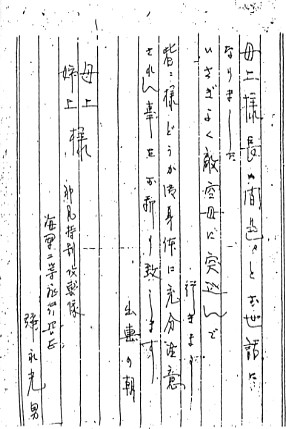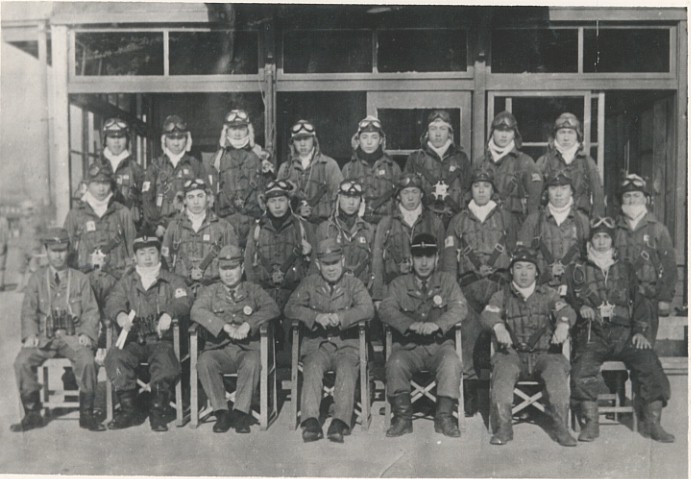On July 3, 1945, a sealed letter was delivered to Harue Yanaga, who lived in Yamamoto Village in Mii-gun, Fukuoka Prefecture. Correspondence there had been cut off for some time, so she turned it over to see if it came from her son Teruo. However, written on the back was a sender whose name was unknown, "Touichi Manzen, Hyakurigahara Navy Air Base, Higashiibaraki-gun, Ibaraki Prefecture." She cut the seal with an feeling of uneasiness.
|
|||||||||||||||
|
|||||||||||||||
|
I had an opportunity to read this last letter after the end of the war. The morning of his sortie is not the day he sortied from Kushira Air Base but rather the day he departed from Hyakurigahara Air Base. Then, this last letter was written about April 22. The details of how Touichi Manzen kept this last letter and why it took two months before being sent can only be imagined. Touichi Manzen belonged to the 601st Air Group's No. 1 Attack Flight Corps, also stationed then at the same Hyakurigahara Air Base. They were in different units, but Mr. Manzen was a friend of Mr. Yanaga since they both received training together in the 23rd Unit at the Naval Flight Training School. Probably Mr. Manzen took care of sending Mr. Yanaga's last letter because of their friendship as classmates as well as being glad to meet again at the same base. Having experienced the same circumstances in the Special Attack Forces, I can imagine to a certain extent the situation during that time. In those days letters that we sent to family and friends were submitted unsealed in a batch to the Warrant Officer in order to maintain military secrets. These letters could not be sent until he censored them. It was prohibited for anyone to send a letter freely. Therefore, it was a time when we could not write anything but typical sentences, such as, "I am earnestly performing my military service, so please rest assured." Upon joining the Special Attack Forces, it was also not unusual to send a last letter addressed to one's mother to give one's farewell to this life. Mr. Yanaga also must have felt bad to have his squad members read his last letter. Therefore, he probably discussed it with his classmate Mr. Manzen, told him his mother's address, and requested him to send it. However, Mr. Manzen was a member of the 601st Air Group's No. 1 Attack Flight Corps, generally known in the Imperial Japanese Navy in those days as the Seiri Unit. He was in a position where he did not know when he would be assigned to a Special Attack Forces unit and would sortie. He could not leave the base as he waited for his Special Attack mission assignment, so he looked for an opportunity of how to send Mr. Yanaga's last letter that he had hidden away. Time passed. And his last hour was imminent. On August 9, 1945, Petty Officer 1st Class Touichi Manzen departed Hyakurigahara Air Base on board a Suisei carrier dive bomber (Judy) as a member of the No. 4 Mitate Unit Kamikaze Special Attack. He carried out a "body-crashing attack" with certain death against an enemy task force that had attacked east of Kinkazan. It was the end of his short 17-year life. This happened one week before the war's end. A last letter and will from Touichi never was delivered to the home of his mother Shizu, who lived in Yokogawa Town in Aira-gun, Kagoshima Prefecture. Perhaps a report was received of an enemy task force near the mainland, and a Special Attack unit was hurriedly organized to immediately sortie, so I guess there was no free time for him to write a last letter. Or perhaps he wrote a last letter and left it with someone. The war may have ended without his getting a chance to send the letter, and it may have got lost in the confusion at the war's end. Anyway, one imagines that he probably earnestly sortied according to orders toward the enemy ships without even dreaming that the war would soon end and without being able to tell his final goodbye to his mother in his faraway hometown. For his mother Shizu, this difference of one week must have caused her exceedingly deep regret that seemed the same as a hundred years. |
|||||||||||||||
|
|||||||||||||||
 Last Letter of
Teruo Yanaga
Last Letter of
Teruo Yanaga